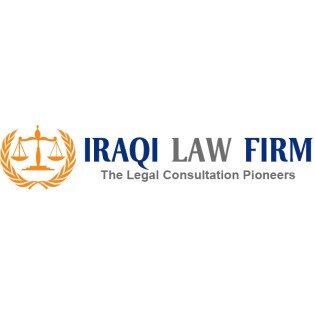Best Water Law Lawyers in Iraq
Share your needs with us, get contacted by law firms.
Free. Takes 2 min.
Or refine your search by selecting a city:
List of the best lawyers in Iraq
About Water Law in Iraq
Water Law in Iraq encompasses the legal framework that governs the management, distribution, and protection of water resources within the country's borders. Given Iraq's arid climate, dependence on major rivers like the Tigris and Euphrates, and complex agricultural demands, water law is a crucial component of natural resource policy. The legislation includes rules on the ownership, use, and conservation of water, as well as regulations related to pollution control, infrastructure development, and international agreements regarding shared watercourses.
Why You May Need a Lawyer
Water Law can be highly technical and involves significant governmental oversight. You might need legal assistance in situations such as:
- Disputes over water access for agriculture or industry
- Navigating government permits for water use or construction near water bodies
- Seeking resolution in cases of water pollution or contamination
- Negotiating water rights with neighboring landowners
- Complying with environmental regulations concerning water resources
- Understanding legal impacts of development projects on water sources
- Engaging in cross-border water-sharing issues with neighboring countries
In these situations, a lawyer with expertise in water law can clarify your rights and advocate on your behalf to protect your interests.
Local Laws Overview
Iraq’s water laws are a blend of ancient codes, national legislation, and international agreements. The 1965 Water Resources Law and subsequent amendments form the backbone of domestic regulation. Key points include:
- All water bodies, streams, and groundwater within Iraq are considered national resources administered by the state.
- Water allocation is prioritized for drinking, agriculture, industry, and environmental preservation, in that order.
- Permits are required for drilling wells, constructing dams, or diverting waterways.
- Pollution of water sources is strictly prohibited, with penalties for unauthorized waste disposal or hazardous discharges.
- The Ministry of Water Resources has broad authority on water use and can issue, deny, or revoke usage permits as needed.
- Special rules apply near major rivers and marshlands, which have ecological and cultural significance.
- Iraq is party to international agreements regulating the flow and use of shared rivers, though enforcement remains complex due to regional disputes.
Frequently Asked Questions
What is considered a water right in Iraq?
A water right in Iraq refers to the legal entitlement to use water from a source for specific purposes such as drinking, irrigation, or industrial activities. These rights are generally granted through permits by the Ministry of Water Resources.
Do I need a permit to dig a well on my property?
Yes, obtaining a permit from the Ministry of Water Resources is mandatory before drilling a well, to ensure water is used sustainably and does not affect neighboring water users.
How does Iraq regulate water pollution?
Water pollution is regulated through strict laws that prohibit dumping waste or harmful substances into water bodies. Violators can face hefty fines, criminal charges, or closure of their facilities.
Can foreign companies acquire water rights in Iraq?
Foreign entities can access water resources, but only with government approval and in compliance with all relevant local regulations and permits.
What happens if someone diverts water from a river illegally?
Illegal diversion of water is a punishable offense under Iraqi law. Offenders may be required to restore flow, pay fines, or face criminal prosecution.
Are there special rules for water use in agriculture?
Yes, agriculture receives prioritized access to water, but farmers must still comply with sustainable usage regulations and permit requirements.
What governmental bodies oversee water issues in Iraq?
The primary authority is the Ministry of Water Resources, supported by the Ministry of Environment and local governments for enforcement and policymaking.
How are disputes over water rights resolved?
Water disputes can be resolved through administrative procedures with the Ministry or, if necessary, through the civil court system with legal representation.
Does Iraq participate in international water agreements?
Yes, Iraq is part of several treaties regarding the management of shared watercourses, particularly the Tigris and Euphrates rivers, although enforcement and cooperation can be challenging.
Can water rights be transferred or inherited?
Certain water use rights, particularly for agriculture, can be transferred or inherited, but any change must be registered and approved by the relevant authority.
Additional Resources
Individuals seeking more information or assistance can refer to the following organizations and resources:
- Ministry of Water Resources - Main authority on policy, permits, and management of water resources.
- Ministry of Environment - Addresses water pollution and environmental protection.
- Local governorates and municipal councils - Handle permits and community-level issues.
- Iraqi Bar Association - For referrals to qualified water law specialists.
- Universities and research centers focused on water studies and policy.
- Regional environmental NGOs working on water and resource preservation projects.
Next Steps
If you need legal assistance in water law, consider the following:
- Gather all relevant documents, such as ownership papers, permits, or correspondence with authorities.
- Contact the Ministry of Water Resources or local government to inquire about the official status of your case or issue.
- Consult with a qualified water law attorney registered with the Iraqi Bar Association to evaluate your legal options.
- Take prompt action if you are facing legal deadlines or enforcement actions to ensure your rights are protected.
- Stay informed about any legislative changes or new policies that may affect your situation.
Legal guidance is essential in navigating the complexities of water law in Iraq. Engaging an experienced lawyer can help protect your rights and interests in all matters related to water law.
Lawzana helps you find the best lawyers and law firms in Iraq through a curated and pre-screened list of qualified legal professionals. Our platform offers rankings and detailed profiles of attorneys and law firms, allowing you to compare based on practice areas, including Water Law, experience, and client feedback.
Each profile includes a description of the firm's areas of practice, client reviews, team members and partners, year of establishment, spoken languages, office locations, contact information, social media presence, and any published articles or resources. Most firms on our platform speak English and are experienced in both local and international legal matters.
Get a quote from top-rated law firms in Iraq — quickly, securely, and without unnecessary hassle.
Disclaimer:
The information provided on this page is for general informational purposes only and does not constitute legal advice. While we strive to ensure the accuracy and relevance of the content, legal information may change over time, and interpretations of the law can vary. You should always consult with a qualified legal professional for advice specific to your situation.
We disclaim all liability for actions taken or not taken based on the content of this page. If you believe any information is incorrect or outdated, please contact us, and we will review and update it where appropriate.
Browse water law law firms by city in Iraq
Refine your search by selecting a city.

















